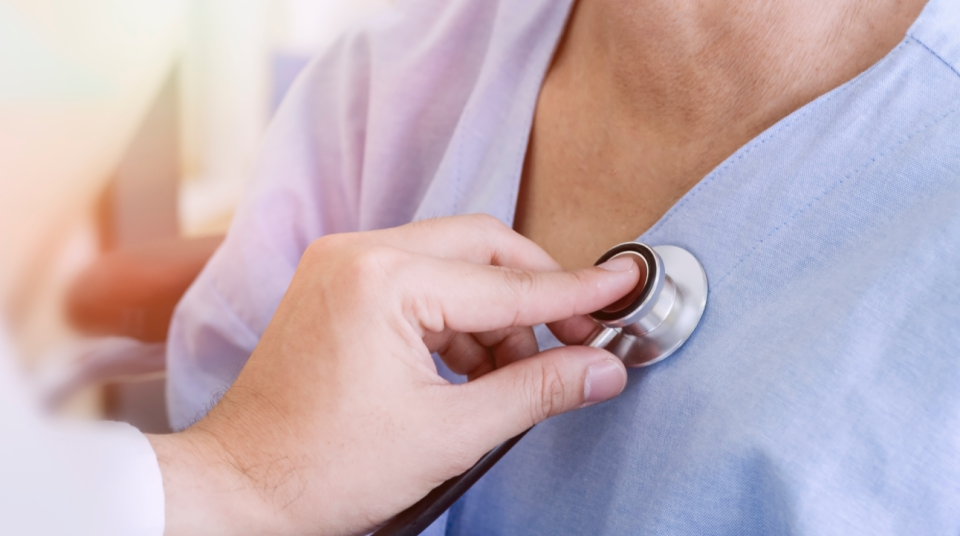'I wasn't too smart': Woman who ignored heart attack for eight weeks avoided hospitals due to COVID-19
Looking for more of the best deals, latest celebrity news and hottest trends? Sign up for Yahoo Lifestyle Canada’s newsletter!

According to a new report from the American Heart Association (AHA), statistics reveal that more people are avoiding seeking urgent care for heart and stroke related emergencies, despite being the leading cause of death around the world.
The cause? COVID-19.
The fear of contracting the novel coronavirus in hospital, as well as a fear of putting additional strain on the healthcare system, has prevented many people from calling 911 when they experience symptoms of a heart attack or stroke.
ALSO SEE: 'Signal for help' campaign aims to assist abuse victims in quarantine
Charley Bednarsh is one of the heart attack survivors featured in a new campaign for the AHA called “Don’t Die of Doubt” aimed at raising awareness for the many signs and symptoms of heart attack and stroke.
In December, Bednarsh, a director of children's services at the New York City Family Justice Center in Brooklyn, became extremely pale and developed a hacking cough. With the encouragement of her colleagues, the 72-year-old visited her doctor where she was diagnosed with pneumonia.
In an interview with the AHA, Bednarsh said she was still feeling persistent back pain in February. She thought it might be a lingering symptom from her pneumonia, perhaps even an internal injury caused by coughing.
ALSO SEE: Anxiety, depression will likely surge during coronavirus pandemic — here's how to combat it
When New York City became embroiled in the pandemic, Bednarsh began to see the impact of the virus on the city; people were unemployed and losing loved ones and acquaintances.
“Nothing I'm experiencing is that bad,” Bednarsh kept telling herself. “There are really sick people out there – and I'm not one of them.”
Bednarsh credits her beloved dog Atticus to helping her realize there was something far more serious at play.
In mid-April, Bednarsh began experiencing sleep disturbances and would wake up to the sounds from her neighbours and the city, while Atticus remained asleep. Soon, Atticus began howling throughout the night, and Bednarsh awoke one morning on the floor of her bedroom, unable to catch her breath, while Atticus howled beside her. Bednarsh told the AHA that pre-pandemic she could walk Atticus for one or two miles a day, but suddenly she couldn’t walk more than a few steps without needing to stop and rest.
Bednarsh said she had convinced herself that she had been an early case of COVID-19, and that the virus had taken such a toll on her body that she began to feel “depressed.”
ALSO SEE: 'I have to stay and help': Family of doctor who died by suicide says she was 'tormented' by COVID-19
In an effort to acquire an antibodies test, Bednarsh reached out to her cardiologist, Dr. Harmony Reynolds. She had been visiting Reynolds for high blood pressure and an irregular heart beat, but was hoping Reynolds could refer her for the antibody test.
According to Bednarsh, her back pain and shortness of breath were red flags for Reynolds, who encouraged her to visit an emergency room.
“People are dying there,” Bednarsh recalled telling her doctor. “It's just not a good place for me.”
Reynolds requested to see Bednarsh the next day, where tests confirmed that she was in fact, experiencing a heart attack. Bednarsh told the AHA that she immediately called her eldest son, Jon, to act as a health advocate for her, and had Reynolds explain the situation to him over the phone.

Within hours, Bednarsh was in recovery at NYU Langone Health after having a stent inserted to her left anterior descending artery, which was “100 per cent blocked.”
Despite her fears of being in hospital, Bednarsh said the experience was “was exceptional from start to finish.”
It was Reynolds who encouraged Bednarsh to share her story with the “Don’t Die of Doubt” campaign and help encourage others to know the signs and symptoms of a cardiac event.
“I'm an intelligent person, but with this I wasn't too smart,” Bednarsh said. “I realize how ridiculous I was. It's embarrassing.”
ALSO SEE: Looking for a non-medical mask? Check out these 28 brands who are helping out their communities
“She's not the only person with heart pain I've told to go to the ER who declined,” Reynolds told the AHA. “I don't know yet of anyone else who's suffered a heart attack and toughed it out at home, but I worry there are more. Some people think a heart attack has to feel so terrible that it would be impossible to ignore. I want to get that out of people's minds.”
Like many people, Bednarsh thought the warning signs for heart attack were what she saw on TV, “a man clutching his chest as he admits to a crime or tells someone he loves them.”

The AHA notes that heart attacks are the leading cause of death for women, and kill more women than all cancers combined. Recognizing the signs and symptoms of a cardiac event and calling 911 as soon as possible is the best course of action - whether it’s a global pandemic or not.
While chest pain is one of the most common indicators of a cardiac event for both men and women, women are more likely to experience shortness of breath, nausea/vomiting, lightheadedness, back and jaw pain. Many women are likely to chalk up symptoms of a heart attack to the flu or acid reflux, and may think that because the symptoms are subtle, they’re not indicative of a heart attack or cardiac event.
Bednarsh said had there not been a lockdown, someone like a friend or colleague, may have recognized the warning signs and encouraged her to get help.
“I was very lucky that I didn’t die,” she said and revealed that since she received her stent she has been walking Atticus without issue.
Let us know what you think by commenting below and tweeting @YahooStyleCA! Follow us on Twitter and Instagram and sign up for our newsletter.


